|
|
|
Sort Order |
|
|
|
Items / Page
|
|
|
|
|
|
|
| Srl | Item |
| 1 |
ID:
185498
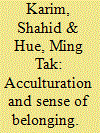

|
|
|
|
|
| Summary/Abstract |
The question of a sense of belonging to a host society is paramount to the study of acculturation in the society of settlement. The study of acculturation seeks to examine how acculturating people make sense of belonging to both their country of origin and the receiving community, and the potential consequences of adaptation. Using Berry’s acculturation typology as an analytical framework, this article examines the sense of belonging among a group of Pakistani secondary school students and compares their accounts of social identification with everyday sociocultural practices in Hong Kong. A phenomenographic analysis of the participants’ interviews reveals a lack of congruence between their sense of belonging and their lived acculturative experience. The findings suggest that categorising acculturating people based merely on their sense of belonging offers a limited understanding of acculturation. The theoretical and research implications of the findings are also discussed.
|
|
|
|
|
|
|
|
|
|
|
|
|
|
|
|
| 2 |
ID:
185506
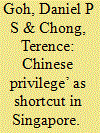

|
|
|
|
|
| Summary/Abstract |
We disagree with Humairah Zainal and Walid Jumblatt Abdullah that Chinese privilege exists in Singapore politics and that it is perpetuated by the political hegemony of the long-ruling People’s Action Party (PAP). Consequentially, we disagree that ‘Chinese privilege’ is thus a useful concept for understanding politics in Singapore. Our rejoinder argues that ‘Chinese privilege’ is under-specified and decontextualized by the authors, used uncritically as a shortcut for the consequences of the long-ruling party’s political hegemony for ethnic relations, and is therefore a polarizing distraction to the critical analysis required to advance anti-racism discourse and understanding in Singapore. We show that the authors have mistook incumbent political privilege for Chinese privilege. We argue that ethnic majority and minority Members of Parliament from both governing and opposition parties have had to simultaneously serve as community leaders and transcend ethnic affiliations to represent national interests.
|
|
|
|
|
|
|
|
|
|
|
|
|
|
|
|
| 3 |
ID:
185505


|
|
|
|
|
| Summary/Abstract |
In the absence of pre-colonial written records, reconstruction of the history and identity of indigenous tribes has to depend on oral stories and the documentation of the ‘other’, while the former is subject to distortion, the latter is often glossed with vested interest. Taking the case of the indigenous tribes of the India-Burma-Bangladesh borderlands, this paper probes the representation of the Zo (Kuki-Chin) people in colonial ethnography, on one hand, and to what extent colonial knowledge was informed by ‘investigative’ or ‘survey modality’, which, in fact, was solely for administrative purpose, on the other. It argues that indigenous tribes of the India-Burma-Bangladesh borderlands were represented as completely fragmented in colonial ethnography, however, behind the colonial policy of classification one can still unearth the ethnic commonality of the various tribes when they are seen through the lens of cultural similarity or as a ‘culture area.’
|
|
|
|
|
|
|
|
|
|
|
|
|
|
|
|
| 4 |
ID:
185497
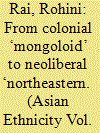

|
|
|
|
|
| Summary/Abstract |
Contemporary India has witnessed a rise in racism discourse, central to which are people from North-East and Himalayan regions, collectively referred to as ‘Northeasterns’. This has recentred ‘race’ and racism as being a theoretical-political problem of contemporary India itself. However, existing literature shows that there is stark under-theorisation of ‘race’ and racism in Indian context. Drawing from ethnographic research and applying the racialization approach, this paper argues that ‘race’ in India is a postcolonial-neoliberal construct, whereby colonial ‘Mongoloid’ is reconstructed into neoliberal ‘Northeastern’, such that ‘race’ in India acts as a layered mode of constructing identity and difference. It further argues that the ‘Northeastern’ category emerges as a result of exclusion from the ‘Indian’ category, which itself is racialized along Hinduised-Aryanised lines, such that racism is a product of a postcolonial centre-periphery power-relation between India and its North-East; thereby making way for critical ‘race’ scholarship in the Indian context.
|
|
|
|
|
|
|
|
|
|
|
|
|
|
|
|
| 5 |
ID:
185504


|
|
|
|
|
| Summary/Abstract |
Frontier tribes, inhabiting the Indo (Naga)-Myanmar border, are at the fringe of the nation-states. They remain outside the radar of connectivity and development. The international boundary line demarcated during the colonial rule, pierces through the middle of many villages. This was reinforced by the post-colonial Indian and Myanmar States, thus deepening the contestation between state and tribal society(s). The Indo (Naga)-Myanmar borderland, elicits the case of nation-state construction as opposed to what Lefebvre posits geographical space, as ‘socially constructed’. The distortion of tribal land and territory in the forms of fencing and securitization amounts to the denial of a tribe’s agency and erasure of their shared history and social relation. The paper charts out the ramification of the colonial state making project in the contemporary frontier tribes. It unfolds the contestation, presence and absence of the state in the borderlands and posits for development with justice.
|
|
|
|
|
|
|
|
|
|
|
|
|
|
|
|
| 6 |
ID:
185503
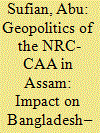

|
|
|
|
|
| Summary/Abstract |
The present study examines the contemporary Bangladesh–India relationship analyzing the dynamics of geopolitics centring the National Register of Citizens (NRC) and the Citizenship (Amendment) Act (CAA)-2019 in Assam, India. On the basis of secondary data, this paper explores the historical and geopolitical roots of volatile present and uncertain future of the non-registered people, often termed as ‘illegal Bangladeshi migrants’ living in Assam, portrayed by the Indian ethnocratic state sidelining India’s longstanding pluralist traditions and exercises. The central argument of the study is that peddling the issue of ‘illegal Bangladeshi migrants’ by Indian political elites is destined to transcend the boundary infusing hostility in future into Bangladesh–India relationship.
|
|
|
|
|
|
|
|
|
|
|
|
|
|
|
|
| 7 |
ID:
185501
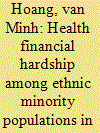

|
|
|
|
|
| Summary/Abstract |
This study was conducted to report the prevalence of financial hardship and identify associated factors among ethnic minority populations in Vietnam. In 2019, we conducted a cross-sectional study of 5,033 ethnic minority participants from 12 provinces located in four socioeconomic regions in Vietnam. Financial hardship was measured by asking the study respondents if they had to borrow money, sell household assets, or stop using health care services due to health care service fees. Among the health service users, 24.0% (95% CI: 22.3–25.8%) faced a health-related financial hardship. Participants with secondary education were more likely to experience financial hardship than illiterate participants. In contrast, those who were able to speak the Vietnamese language, had a religious affiliation, or had health insurance were likely to have lower financial hardship. Continuing to expand health insurance coverage and develop essential packages covered by health insurance is vital to reducing financial hardship.
|
|
|
|
|
|
|
|
|
|
|
|
|
|
|
|
| 8 |
ID:
185502


|
|
|
|
|
| Summary/Abstract |
This article focuses on the Flat Land Yao (Pingdi Yao,平地瑶) people’s ancestor worship reflected in the Meishan scroll paintings which were discovered in Shuibin village, Guanyin township, Gongcheng Yao Autonomous District, Guangxi Zhuang Autonomous Region, China in 1984. The Yao people believed that Meishan was not only their ancestral habitation located in ancient central Hunan, but also the pure land for the ancestors’ souls. For the long migration duration and the unfavourable preservation environment, the existing number of Meishan scroll paintings of Flat Land Yao is small, and the two sets of scrolls in Gongcheng Yao Autonomous District are rare art works in the series. The dress style, decoration, generation names of the ancestors, and the skills of the painters reflected that the Flat Land Yao people had absorbed the culture of the surrounding nationalities, especially the Han culture. Confucianism also had an important influence on the Flat Land Yao.
|
|
|
|
|
|
|
|
|
|
|
|
|
|
|
|
| 9 |
ID:
185500


|
|
|
|
|
| Summary/Abstract |
Based on the literature review, we conclude a variety of foreign and domestic factors directly and indirectly contributed to the migration of the Chinese indentured laborers from the late nineteenth century to the early twenty-first century. These factors can be summarized as follows: (1) The domestic economy; (2) The civil war; (3) The legalization of Chinese emigration; (4) The change of the international situation; (5) The labor demanded by the industrialization in colonial countries. Moreover, we interviewed several Taiwanese and Hakka migrants and state four migrating routes. The Hakka culture in Africa is rich and diverse. When we start to know their origins and migration routes, we can have a clear and complete knowledge of African and Asian history.
|
|
|
|
|
|
|
|
|
|
|
|
|
|
|
|
| 10 |
ID:
185499


|
|
|
|
|
| Summary/Abstract |
This article focuses on the stigmatisation of East Asian students within Western universities. This is necessary because East Asian students are often overlooked in existing literature about racism in Western academia. It is argued that East Asian students may be generalised as undesirable students in ways that resonate with more broadly held prejudices about East Asian people. To illustrate this, academic publications about East Asian students are critiqued. This involves identifying, analysing and deconstructing the stereotypes of East Asian students which inadvertently totalise them as homogenous, inadequate and deficient. More specifically, it is argued that East Asian students are often unfairly depicted as: a) lacking critical thinking skills; b) being prone to plagiarism; and c) harming the educational environment. This article introduces the notion of ‘the myth of academic tolerance’ and calls upon academics and universities to actively resist the stigmatisation of East Asian students.
|
|
|
|
|
|
|
|
|
|
|
|
|
|
|
|
| 11 |
ID:
185496
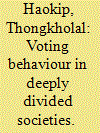

|
|
|
|
|
| Summary/Abstract |
Voting patterns in the hills of Manipur show high ethnic voting indicating extremely partisan attachments. The salience of ethnicity in voting preference is reinforced by conflicts in the past. Periodic elections only exacerbated such divisions through partisan mobilisation and competition for representation along ethnic lines. Cross-ethnic voting is prevalent among groups wherein cousinage alliance cannot be forged due to past conflicts. The neck and neck competition for political representation among ethnic groups has sidelined the democratic rights of individuals over partisan group interests. In such deeply divided societies ensuring individual rights is the challenge of democratic governance, and the only viable solution to this pervasive problem appears to be a constitutional reform with the aim of having a more inclusive representation.
|
|
|
|
|
|
|
|
|
|
|
|
|
|
|
|
|
|
|
|
|